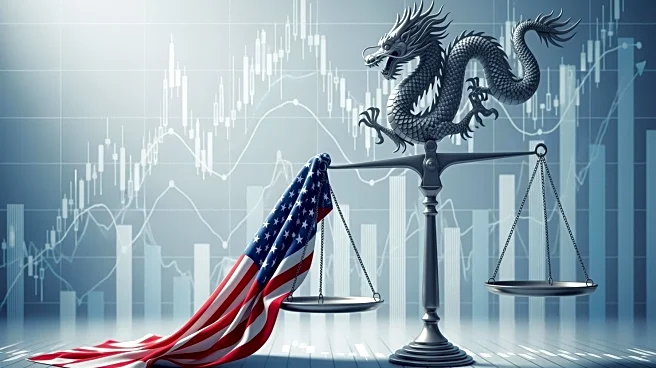What's Happening?
The U.S. stock market is experiencing increased volatility due to renewed U.S.-China trade tensions and upcoming earnings reports from major companies like Tesla and Netflix. The Nasdaq Composite recently closed down by 0.2%, while the Dow Jones Industrial
Average and S&P 500 saw slight gains. The market's instability is further fueled by concerns over regional bank credit issues. The CBOE market volatility index, known as Wall Street's 'fear gauge,' has surged to its highest level in nearly six months. The U.S. has threatened to increase tariffs on China by November 1, in response to China's rare-earth export controls. President Trump is scheduled to meet with Chinese President Xi Jinping in South Korea in two weeks, which could impact future market movements.
Why It's Important?
The current market volatility has significant implications for U.S. industries and investors. The potential tariff hikes could affect various sectors, particularly those reliant on Chinese imports. The upcoming earnings reports from major corporations will provide insights into the health of the U.S. economy, especially in light of the ongoing government shutdown that has halted economic data releases. The Federal Reserve's upcoming monetary policy meeting, where a rate cut is expected, will also be influenced by these developments. Investors are closely monitoring these factors to gauge the market's direction and potential risks.
What's Next?
Investors and analysts are awaiting the release of the U.S. consumer price index for September, which will be crucial for assessing inflation trends. This data, along with corporate earnings reports, will inform the Federal Reserve's decision on interest rates at its meeting on October 28-29. The outcome of President Trump's meeting with President Xi Jinping could also have a significant impact on trade relations and market stability. Stakeholders are preparing for potential shifts in market dynamics based on these upcoming events.
Beyond the Headlines
The ongoing trade tensions and market volatility highlight the interconnectedness of global economies and the impact of geopolitical events on financial markets. The situation underscores the importance of strategic planning and risk management for investors and businesses. Additionally, the delayed economic data due to the government shutdown emphasizes the reliance on corporate reports for economic insights, which could influence future policy decisions.
















